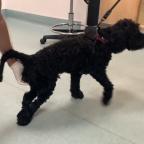
PDSA Weekly Vet Q&As 23 April
Dear PDSA Vet,
I've noticed that my cat has smelly breath and he has put on some weight – could these two things be related? Tim
Dear Tim, there are a several possible causes of bad breath, including dental disease, kidney disease, a foreign body in the mouth or, in rare cases, a mouth tumour. So I'd advise taking your cat to your vet for a check-up to find out what's causing these problems. Cats that are overweight are at risk of many health problems, including diabetes. Diabetes can also sometimes cause your pet's breath to smell differently; like pear drops or even nail varnish remover. Your vet will be able to advise you on what the problem is and the best course of action. There may be no relation between the bad breath and weight gain, but both will need addressing. Your vet will be able to recommend a diet and exercise programme to help your cat lose weight safely. It's important for cats to do this gradually, as rapid weight loss can be dangerous. For more information go to www.pdsa.org.uk/badbreathincats
Dear PDSA Vet,
My Syrian hamster keeps chewing the roof of her cage. It makes such a racket when we try to watch TV, plus I'm worried she could escape. What can we do to make her stop? Harley
Dear Harley, Hamsters have teeth that are continuously growing, and these need to be worn down through chewing, however they can also gnaw excessively if they are bored, frustrated and lack stimulation. Dental problems can arise if the teeth aren't worn down so it's important to provide hamster-safe gnawing blocks and fruit branches in their home. I would also recommend getting your hamster's teeth checked by your vet to make sure there are no problems. Hamsters are very active animals and travel miles every night, so make sure your hamster has a large home, with a large wheel, lots to do and places to explore. They love to forage and climb, so add in interesting levels and textures to their environment, with places to investigate and a deep base so they can burrow. For more tips on caring for hamsters visit www.pdsa.org.uk/hamster
Dear PDSA Vet,
Galahad, my Great Dane, is losing patches of his hair. What can I do? Rick
Dear Rick, the treatment for alopecia (fur loss) depends on the underlying cause. It could be a hormonal condition, such as an underactive thyroid gland (hypothyroidism) or an overproduction of hormone by a gland near the kidney (Cushing's disease). When baldness is caused by a hormonal problem the hair loss is usually a symmetrical 'mirror image' on both sides of the body. Parasites, such as mites or fleas, can also cause hair loss, as can skin infections or allergies. Your vet will need to do some investigations to find out what the problem is, which may include looking through their fur, possibly skin scrapings and blood tests.
Dear PDSA Vet,
My 16-week-old kitten Tilly has just started going outside, but she keeps climbing very tall trees. We've had to get long ladders out to help her down and I'm scared she may injure herself. We have three other cats so keeping her indoors isn't really an option, is there anything we can do to discourage her from climbing? Mark
Dear Mark, this can be a tricky problem to solve. First, make sure that you provide her with plenty of high-up places indoors that she can safely access. A lot of cats find living with other unrelated cats stressful, so she may be trying to find a way to avoid them while enjoying the freedom of exploring. Cats feel most secure when high up as they can look out over their surroundings to hunt while avoiding conflict with other cats. Try providing lots of cat beds around the house, safely placed on top of places like shelving and bookcases. Tall climbing towers are useful too, so that she can safely develop her climbing skills indoors. Next, don't be too hasty to "rescue" her. If she is clearly in danger then she will need help, but if left for a while she should learn that she needs to get down for herself and figure out a way to do it, but don't leave her up there for more than a few hours. She will become more keen to investigate a route down as she starts to become hungry. To find out how to minimise stress in multi-cat households, visit www.pdsa.org.uk/cats.
PDSA is the UK's largest vet charity providing a vital service for pets across the UK whose owners struggle to afford treatment costs for their sick and injured pets. For many vulnerable pets, PDSA is there to help when there is nowhere else for their owners to turn. Support from players of People's Postcode Lottery helps us reach even more pet owners with vital advice and information.







